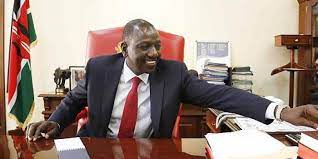Barely twenty-four hours after his investiture at a packed stadium in the capital Nairobi as Kenya’s fifth president William Ruto has immediately proceeded to reverse some of his predecessor’s policies over food and fuel subsidies and nominations by the Judicial Service Commission.
Acting on one of his election campaign promises, Ruto, 55 passed signed a memo in which he announced immediate plans to dispense with food and fuel subsidies, doubting their efficacy and arguing that they were prohibitively expensive.
Ruto was Uhuru Kenyatta’s deputy during the latter’s two five-year terms in office.
Kenyatta who attended Ruto’s inauguration on Tuesday despite rooting for opposition challenger Raila Odinga in last month’s poll, had refused to removed these subsidies while he was in charge as president.
Under the new directive all cargo clearance would now be returned to the port of Mombasa.
Kenyatta’s reign oversaw the transfer of all port services to Naivasha as Kenya moved to repay a loan from China earmarked for constructing a railway line beginning in the port of Mombasa to Nairobi.
However, in another radical move which drew a marker away from Kenyatta’s receding years at the presidency, Ruto has appointed six judges whose nomination by the country’s Judicial Service Commission was ignored by his predecessor.
Kenyatta had criticised the reputation of the judges in question as unsuited to the roles to which they were nominated.
The judges have since taken the oath of office earlier on Wednesday.
Sources close to him say more is up Ruto sleeves as he attempts to dismantle some of Kemyatta’s more controversial policies while in charge of Kenya, East Africa’s biggest economy with a population of 53.7 million.
Amid pomp and ceremony witnessed by some twenty heads of state and government in Africa, Ruto took the oath of office while reiterating a promise to united a divided country, rein in corruption and grow the economy by creating jobs especially for young Kenyans.
Ruto and Kenyatta fell out after the latter’s reelection for a second term in 2018.
WN/as/APA


